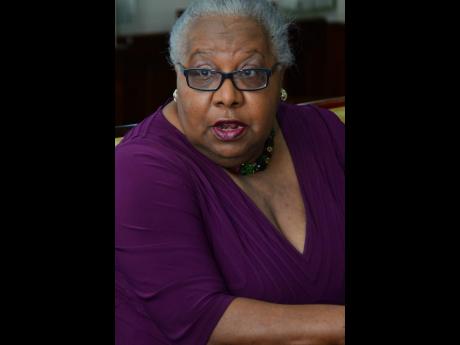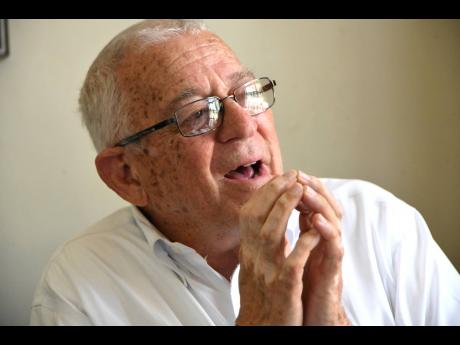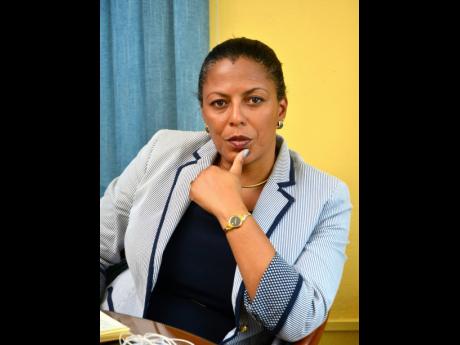Pathways pandemic
Gov’t, schools on collision course over new sixth-form model
WIDESPREAD SUPPORT for concept and ideals aside, the Government’s ‘mandatory’ seven-year secondary-school programme has put it on a collision course with stakeholders in the sector, with many already suggesting that a sixth-form pandemic has been...
WIDESPREAD SUPPORT for concept and ideals aside, the Government’s ‘mandatory’ seven-year secondary-school programme has put it on a collision course with stakeholders in the sector, with many already suggesting that a sixth-form pandemic has been created.
Sector personnel said they were left with gaping mouths as Education Minister Fayval Williams shed light on some of the fine print of the programme outlined in Parliament two weeks ago. While the Government’s efforts have been lauded, the stakeholders say the current programme, as outlined, will result in worsening problems for the sector, beginning with a logistical nightmare over the monitoring process.
Stakeholders have concluded that the programme is the Government’s effort to stem youth unemployment, and keeping the youth engaged longer in school activities. Now they are bracing for the administrative combustion to be created when schools will begin monitoring their cohorts, in or out of parish.
Williams, at a virtual town hall meeting on November 4, said all secondary schools are facilitating the programme in partnership with 24 private and 10 public tertiary institutions. Secondary schools without space were told to adopt a blended approach of face-to-face and online school, and parents were urged to report schools which suggested they did not know, or had any space for their children. Institutions without space will not only seek space and assist with placement, but must track them in the system.
WHO WILL BENEFIT?
Beneficiaries of the programme are students under age 18, and those still below age 18 as at August 31, 2021.
This as the Ministry of Education, Youth and Information (MOEYI) has insisted that the programme is mandatory, but the legal basis for that is being questioned.
“Every effort to keep our young people occupied is to be applauded. But we are to do things properly. There is nothing in law that I know of that support mandatory education at that level. And there is no system at the ministry for that level of tracking either,” said Maxine Henry-Wilson, former minister of education from 2002-2007.
“I don’t know where the idea of the use of the term ‘mandatory’ comes from. I see nothing in the Education Act or the regulations to support a mandatory programme,” said Winston Smith, Jamaica Teachers’ Association president.
“I think we should be careful about how we used the word ‘mandatory’, because nobody is going to be arrested and taken to prison for not participating in the programme,” said Garth Anderson, the principal of Church Teachers’ College (CTC) in Mandeville.
“I support the programme totally, and no one could be against the furtherance of education. I was in favour, in my time, of post-secondary education, but I did not at any time support the establishment of a sixth form in every school or a mandatory two-year extension,” said Ronald Thwaites, also a former education minister.
Gleaner columnist Peter Espeut, writing in The Gleaner on November 12, outlined the crisis facing the sector and pointed to the students who will become ‘automatic sixth-formers’.
“In 2019, only 43.6 per cent of Jamaican students taking the exam (many did not take it) were able to pass at least five subjects at the Caribbean Secondary Education Certificate after five years of high school. Each year about 25 per cent of secondary students leave school without any certification at all; sadly, many of these young Jamaicans are reading well below primary-school level,” he wrote.
“After 19 months of the COVID-19 pandemic, this situation is undoubtedly much worse, with an accumulated deficit of literacy, human formation in values and discipline, and loss of the habit of learning. At this historically low point, what is the best strategy to take us out of this crisis?” he asked.
PATHWAY TO TERTIARY LEVEL
It appears to be a pathway to tertiary institutions, though no more than 36 per cent of about 40,000 students matriculate to six form, Espeut said.
Anderson said the MOEYI has sought from CTC the numbers of students admitted this academic year who fall in the eligible category. A commitment was given that the institutions will receive $120,000 over two years ($60,000) per year for each student admitted. Students pursue a four-year degree programmes becoming trained teachers on completion.
Some institutions’ head said they were unaware that the programme was in train, while others said they admitted their regular cohort of students.
He believes the implementation of the programme was ill-timed.
“The idea is that once you have completed fifth form, you should have somewhere else going to pursue further studies. That is commendable. But we are in a pandemic and recovery is yet to be completed.
The ministry, in response through its communication arm last week, said students will preregister at their schools just like the current preregistration process.
“The students will indicate their Pathways programme of interest and if they are interested in an off-site provision, that data is collated by the sixth-form coordinator and shared electronically with the tertiary institution of choice. They complete the registrations and orientation with those students, and they commence their programme of study,” a response from Colin Steer, director of communications in the MOEYI, said.
“The coordinators of the tertiary institutions will share attendance and performance data monthly, using an electronic template. Virtual monitoring meeting will be held monthly to include a CEO of tertiary (institutions) education officers and TDO’s of high schools, the coordinators at the secondary and tertiary levels, and students’ representatives…” it also said.
These individuals make up a monthly steering committee, and a monthly reporting template is also in place to capture strengths and challenges and inform interventions, the MOEYI said. Other support tools are also being integrated.
High-performing Ardenne High School principal Nadine Molloy said the country must look beyond COVID-19 and lockdown.
“If Ardenne has to take all its current cohort of grade 11 to grade 12, we would not be able to have grade 13. And if we have to place our students elsewhere, who is going to monitor them?” she pointed out to The Gleaner in an interview, after a long post on social media site Facebook.
Many have no capacity beyond grade 11 to accommodate students, and both Molloy and Anderson, and others consulted, have grave concerns about the administrative bottleneck the programme will create.
‘TOTALLY UNNECESSARY’
“… Our students come from every parish in Jamaica. We neither have the desire nor capacity to interface with all the institutions from which the students come. How is that going to be executed. That is an administrative bottleneck that will be created, and it’s totally unnecessary. So that part is not properly thought out,” he suggested.
“I think the ministry must explain how the tracking will be executed. The principal of the sending school has a responsibility to ensure that the students are placed. It begs the question also as to what is available... What are the options if someone does not want to go to any of those? Are you obliged to send them to UWI?” questioned Henry-Wilson.
“And this myth about the ministry is going to use a learning management system to track students, the ministry has no such thing,” she said, adding that she was recently involved in a programme to measure learning loss, which required a comparison of before and after.
“There is no such information. They (ministry) did not know. I know they are trying to build one, but it’s certainly not available yet,” she told The Gleaner.
Molloy said the level of discussions held so far could not be classified as consultations, which Kasan Troupe, acting chief education officer, said were held.
“Everything in education is achieved through creating relationships that allow for thoughts to be exchanged and common good to be arrived at. Sometimes it is a rough and rocky road to arriving at what we need to do, but the process has to be respected. Are we doing that?” Molloy asked in her post.



